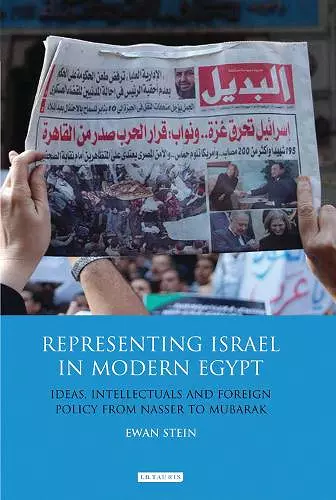Representing Israel in Modern Egypt
Ideas, Intellectuals and Foreign Policy from Nasser to Mubarak
Format:Hardback
Publisher:Bloomsbury Publishing PLC
Published:4th Sep '12
Currently unavailable, and unfortunately no date known when it will be back

Incorporating the writings of prominent political thinkers, this book looks at how approaches to Israel have been elaborated through broader ideologies - in particular liberal nationalism, Marxism and Islamism. It argues that representations of Israel have reflected Egyptian conceptions of self.
From the heady days of Nasser's Arab nationalism to the cold peace of the Mubarak era, the idea and reality of Israel has occupied a central position in Egyptian politics, both domestic and foreign. Ewan Stein seeks to explain and historicise the fragile state of 'no war, no peace' that followed the 1979 Camp David Accords, examining the way in which domestic factors interact with global and regional shifts to shape attitudes to Israel in the Arab world's most populous country. Incorporating the writings of influential thinkers, from Sati' al-Husri to Sayyid Qutb to Mohamed Hassanein Heikal, this book explores the way in which approaches to Israel have been elaborated through broader ideologies and movements, in particular liberal nationalism, Marxism and Islamism. Tracing Egypt's ideological development back to the 1930s, when social movements such as the Muslim Brotherhood took root, Stein argues that Palestine and the Zionist threat came to be linked to Egypt's national and revolutionary struggle - Israel was collapsed into an extension of imperial power, especially after the 1956 Suez crisis.
Nasser's defiant banner of Pan-Arabism soared against Zionism until the ferocious defeat of 1967 unleashed a wave of internal criticism and unrest to usher in a new era of 'peace' and realignment with the West. At the heart of this book is the way in which these tremendous foreign policy shifts have been played out on the Egyptian stage as Israel has been 'instrumenatalised' by regimes and social movements. Egypt's conceptions of self have been neither consistent nor unified, and this is mirrored in shifting approaches to Israel and points to an inherent tension in the dynamics of state-societal relations. This book provides nuanced and original insights into the relationships between state, society and foreign policy within the context of Egyptian nationalism and broader Middle Eastern politics.
'This is a wonderful book. It has been extremely difficult to find an angle to analyse the attitude towards Israel in Egypt and Ewan Stein has found the right one. By analysing it in a broader ideological and political context in Egypt and the Arab world, Stein has had to read a tremendous amount of Arabic literature from a host of different currents. As a result, not only does the reader obtain a view of Egyptian politicians and thinkers on Israel, but he/she also acquires an overview of all the different currents that have been active in Egypt from the 1930s until now. This is a rare feat, because one is easily lost and distracted in the web of ideologies and figures who have formed the image of Zionism in Egypt...In this book, both in its scope as well as its theoretical approach with regard to the 'internal' approach and state-society relations, rather than an Arab point of view, he demonstrates how important it is to incorporate the internal dimension in explaining a phenomenon which is otherwise always analysed only in terms of foreign policy and foreign interests.' Dr. Roel Meijer, Lecturer in Modern Middle Eastern History, Radboud University, Nijmegen, the Netherlands.
ISBN: 9781848854604
Dimensions: unknown
Weight: 444g
256 pages